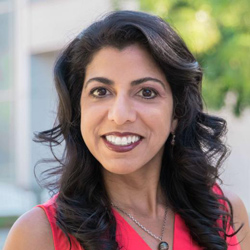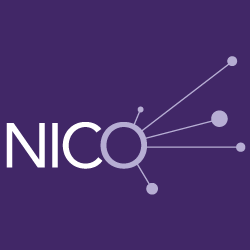Events
Past Event
WED@NICO SEMINAR: Raissa D'Souza, University of California, Davis "Complex Networks with Complex Nodes: Emergent Behaviors and Control"
Northwestern Institute on Complex Systems (NICO)
12:00 PM
//
Lower Level, Chambers Hall
Details

Speaker:
Raissa D'Souza, Professor and Associate Dean for Research, College of Engineering, University of California, Davis
Title:
Complex Networks with Complex Nodes: Emergent Behaviors and Control
Abstract:
Real world networks -- from brain networks to social networks to critical infrastructure networks -- are composed of nodes with nonlinear behaviors coupled together via highly non-trivial network structures. Approaches from statistical physics reveal the fundamental implications that complex network structure has on network function and resilience. In contrast, approaches from dynamical systems and control theory reveal the impact that nonlinear nodal dynamics have on emergent behaviors when connected together in simple networks. This talk presents recent work bridging the fields. We show that the interaction between the nodal dynamics and network structure can give rise to novel emergent synchronization behaviors and extend the analysis of cluster synchronization to hypergraphs, capturing higher-order interactions in networks. With respect to cascading failures, we show that adding in oscillatory nodal dynamics to classic models of self-organized-criticality leads to an emergent timescale and the occurrence of self-amplifying dragon king failures that wipe out the system. Finally, we discuss the frontiers of control of complex networks with non-linear nodes, identifying the key challenges and opportunities for bridging control theory, dynamical systems and statistical physics.
Speaker Bio:
Raissa D'Souza uses the tools of statistical physics and applied mathematics to develop mathematical models capturing the interplay between the structure and function of networks, including dynamical processes unfolding on networks. Her focus is on the abrupt onset of large-scale connectivity in networks, network synchronization behaviors and models of cascading failure. The general principles derived provide insights into the behaviors of real-world networks such as infrastructure networks and social networks, and opportunities to identify small interventions to control the self-organizing, collective behaviors displayed in these systems. She collaborates broadly with faculty within the college and in physics, statistics, political science and the Primate Center.
Location:
In person: Chambers Hall, 600 Foster Street, Lower Level
Remote option: https://northwestern.zoom.us/j/92514761999
Passcode: NICO2023
About the Speaker Series:
Wednesdays@NICO is a vibrant weekly seminar series focusing broadly on the topics of complex systems and data science. It brings together attendees ranging from graduate students to senior faculty who span all of the schools across Northwestern, from applied math to sociology to biology and every discipline in-between. Please visit: https://bit.ly/WedatNICO for information on future speakers.
Time
Wednesday, October 4, 2023 at 12:00 PM - 1:00 PM
Location
Lower Level, Chambers Hall Map
Contact
Calendar
Northwestern Institute on Complex Systems (NICO)
WED@NICO Winter Seminar Series returns on January 28th!
Northwestern Institute on Complex Systems (NICO)
12:00 PM
//
Lower Level, Chambers Hall
Details

The Wednesdsays@NICO speaker series will return for the winter quarter on January 28th, 2026, running through March 4th. Speakers will be announced in January!
Location:
In person: Chambers Hall, 600 Foster Street, Lower Level
Remote option: Zoom links will be provided
About the Speaker Series:
Wednesdays@NICO is a vibrant weekly seminar series focusing broadly on the topics of complex systems, data science and network science. It brings together attendees ranging from graduate students to senior faculty who span all of the schools across Northwestern, from applied math to sociology to biology and every discipline in-between. Please visit: https://bit.ly/WedatNICO for information on future speakers.
Time
Wednesday, January 28, 2026 at 12:00 PM - 1:00 PM
Location
Lower Level, Chambers Hall Map
Contact
Calendar
Northwestern Institute on Complex Systems (NICO)

